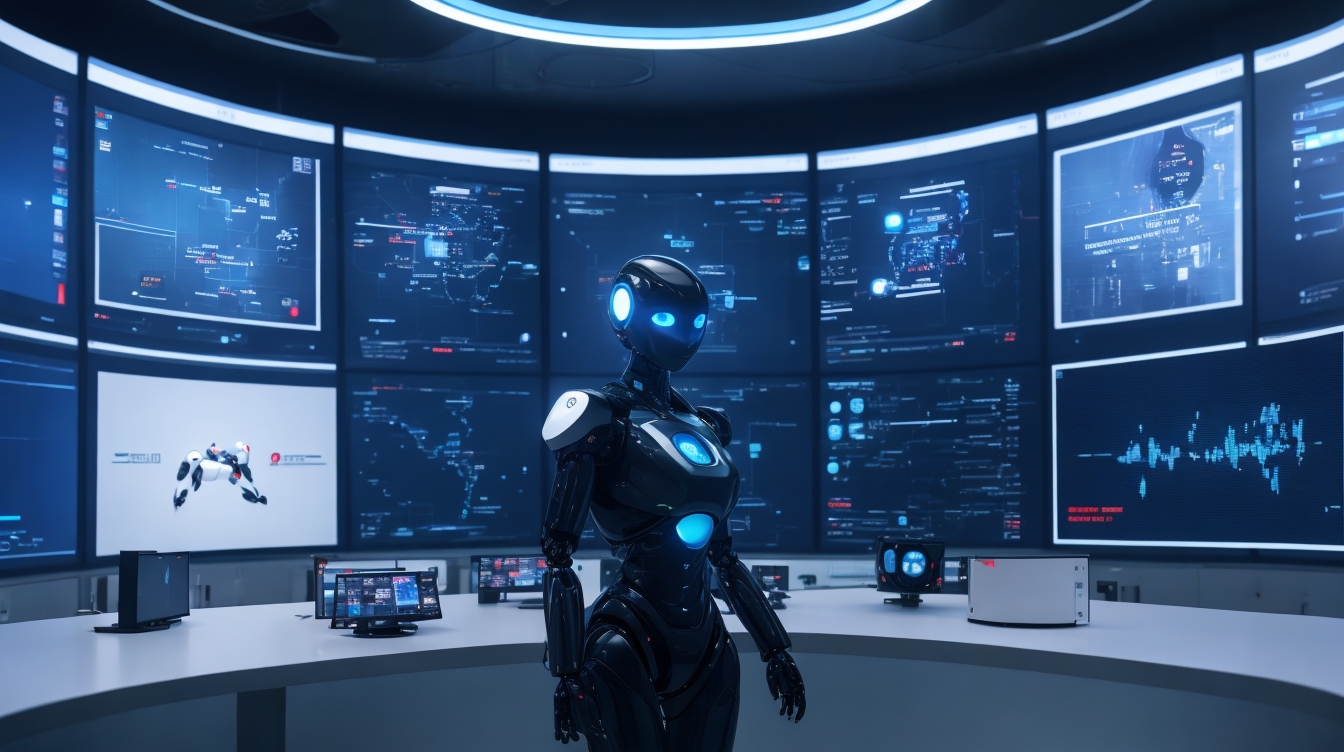AI for Content Planning
In the ever-evolving landscape of content marketing, staying relevant and engaging with your audience requires constant innovation. Enter Artificial Intelligence (AI), a revolutionary technology that is transforming the way content is planned, created, and delivered.
AI has become a game-changer in content planning, allowing marketers to leverage its power for efficient and personalized content creation.
But what exactly is AI content creation, and how does it work? In this article, we will explore the role of AI in content planning, the tools available, and its potential for the future of content marketing.
What exactly is AI content creation?
AI content creation refers to the use of artificial intelligence technology to automate various aspects of the content creation process. This includes generating ideas, researching topics, writing content, editing and proofreading, and even creating video and audio content.
By utilizing algorithms and machine learning, AI technology can mimic human intelligence and assist content creators in producing high-quality and targeted content at scale.
How does AI content creation work?
AI content creation works through a combination of Natural Language Processing (NLP) and machine learning algorithms. These algorithms learn from vast amounts of data to understand language patterns, tone, and context. With this knowledge, AI systems can generate content that is coherent, grammatically correct, and aligned with the desired style and tone.
Will AI take over human content creation?
While AI is undoubtedly transforming the content creation landscape, it is unlikely to completely replace human content creators. AI technology enhances and streamlines the content creation process, allowing marketers to focus on more strategic and creative tasks. Human creativity and critical thinking are essential in crafting unique and compelling content that resonates with the audience.
What type of content does AI technology work best for?
AI technology is well-suited for creating data-driven and data-heavy content, such as financial reports, product descriptions, and sports scores. It is also valuable in generating personalized content tailored to specific target audiences. However, AI may not be as effective for content that requires deep emotional understanding or subjective interpretation, such as poetry or complex storytelling.
The Role of AI in Streamlining Content Creation
In the fast-paced world of content marketing, time is of the essence. AI technology plays a crucial role in streamlining the content creation process, enabling marketers to work more efficiently and effectively. Let’s explore some key areas where AI can make a significant impact:
Automating tasks with AI for efficient content creation
AI can automate repetitive and time-consuming tasks, freeing up valuable time for content creators. It can assist with tasks like keyword research, topic generation, content optimization, and even social media scheduling. By leveraging AI technology, marketers can be more productive and deliver content faster without compromising on quality.
Using AI for idea generation and research
Generating fresh and engaging ideas is a common challenge for content creators. AI technology can analyze vast amounts of data, including social media trends, search queries, and competitor analysis, to generate data-driven ideas that resonate with the target audience. AI-powered tools can also provide valuable insights and research on specific topics, saving content creators time and effort.
AI tools for editing and proofreading content
To ensure error-free content, AI-powered tools like Jasper and Grammarly can be used for automated editing and proofreading. These tools can detect grammar and spelling errors, suggest corrections, and even improve the overall readability and coherence of the content. With AI tools, content creators can review and refine their content efficiently, eliminating the need for multiple rounds of manual editing.
The shift towards AI-generated video and audio content
Video and audio content have gained tremendous popularity in recent years. AI technology is now being used to generate video and audio content, ranging from voiceovers and automated video editing to complete video production. Tools like Synthesia enable marketers to create personalized videos at scale, reducing production costs and time while maintaining high-quality content.

AI Tools for Content Planning and Creation
To fully leverage the power of AI in content planning and creation, various AI tools have emerged in the market. Let’s explore some of the leading AI tools and their applications:
AI tools for content writing: Jasper and Grammarly
Jasper is an AI-powered writing assistant that helps content creators with generating ideas, improving clarity, and optimizing content for search engines. Grammarly, on the other hand, is an AI-driven tool that assists with grammar and spelling corrections, as well as enhancing the overall readability of the content. These tools can save time and ensure high-quality content output.
AI tools for content strategy: HubSpot and Frase
HubSpot’s Content Strategy tool combines AI with real-time SEO recommendations to help marketers strategize and plan their content. It provides insights on keyword optimization, content length, and topic ideation, assisting content creators in delivering content that aligns with the target audience’s search intent. Frase, another AI tool, enables content creators to generate content briefs, conduct comprehensive research, and optimize content for conversation-focused SEO.
AI tools for video content creation: Synthesia
With the rising popularity of video content, Synthesia is an AI-powered tool that allows marketers to create personalized videos at scale. By leveraging AI technology, marketers can generate lifelike avatars, automate video editing, and customize content based on individual audience segments. This enables brands to deliver personalized video content that resonates with their audience, driving engagement and conversions.
Personalizing Content with AI
The importance of targeted and personalized content
In an era of information overload, personalized content is key to capturing and retaining the attention of your audience. AI technology plays a pivotal role in personalizing content by analyzing user data, such as browsing history, preferences, and demographics. This enables marketers to tailor their content to individual interests and deliver a personalized experience, ultimately improving engagement and conversion rates.
How AI makes content more personalized
AI algorithms analyze user data and behavior to gain insights into individual preferences and interests. With this information, content creators can dynamically generate personalized content, such as website copy, product recommendations, and email newsletters. AI-powered personalization tools enable marketers to deliver the right content to the right audience at the right time, resulting in higher engagement and conversion rates.
Dynamic content tools for personalized website experiences
AI-powered tools like Dynamic Yield and Evergage empower marketers to create personalized website experiences. These tools analyze user behavior in real-time, allowing content creators to display customized content, promotions, and recommendations based on an individual’s browsing history and preferences. This level of personalization enhances the user experience, increases time spent on the website, and ultimately boosts conversions.
AI in email marketing: Curated email newsletters
Email marketing remains an effective way to engage with your audience. AI technology can assist in curating personalized email newsletters by analyzing user preferences and recommending relevant content. These AI-powered tools automate the process of content selection and optimization, improving the open rates, click-through rates, and overall effectiveness of email marketing campaigns.
The Future of AI in Content Planning
The growing role of AI in content marketing
As AI technology continues to develop and improve, its role in content marketing is bound to expand. AI will play a vital role in assisting marketers with audience insights, content strategy, and personalized experiences. Content creation will become more efficient and targeted, allowing marketers to deliver impactful content at scale.
How AI improves user experience on websites
AI-powered personalization tools are revolutionizing the user experience on websites. By analyzing user data in real-time, AI algorithms can deliver personalized content, recommendations, and promotions, creating a tailored experience for each visitor. This enhances engagement, reduces bounce rates, and increases conversions, ultimately improving the overall user experience.
The automation of content marketing processes with AI
AI technology has the potential to automate various content marketing processes, freeing up valuable time for marketers. From content ideation and creation to distribution and optimization, AI-powered tools can handle repetitive and time-consuming tasks efficiently. This automation enables marketers to focus on strategic planning, creative pursuits, and building meaningful connections with their audience.
The potential of AI in content marketing: What’s next?
The future of AI in content marketing holds exciting possibilities. With advancements in Natural Language Processing and machine learning, AI will continue to evolve and offer more sophisticated content creation and personalization capabilities. We can expect AI to play a central role in content marketing strategies, delivering innovative and targeted content experiences that captivate and engage audiences in new and exciting ways.
Conclusion
The advent of AI technology has transformed the content planning landscape, empowering content creators to streamline processes, improve efficiency, and create personalized experiences for their audience. From automating tasks to generating personalized video content, AI tools are revolutionizing content creation.
The future of AI in content planning is bright, promising innovative ways to connect with audiences and deliver high-quality, targeted content. As content marketers embrace this exciting technology, they must navigate the balance between AI-driven automation and human creativity to create truly compelling and impactful content in the digital age.

AI and SEO Integration
AI technology plays a significant role in improving SEO strategy by analyzing search patterns, user behavior, and contextual information. It can identify relevant keywords, optimize content for search engines, and provide real-time recommendations for improving SEO performance. AI tools like MarketMuse and BrightEdge are specifically designed to improve SEO strategy by leveraging AI algorithms.
AI tools specifically designed for SEO
AI-powered SEO tools like MarketMuse, BrightEdge, and SEMrush use machine learning algorithms to analyze data and provide insights for optimizing content. These tools can identify content gaps, provide keyword recommendations, analyze competitor strategies, and track search engine rankings. By leveraging AI in SEO, marketers can ensure their content ranks higher, reaches the right audience, and drives organic traffic.
The impact of AI on search engine rankings
AI's impact on search engine rankings is significant. As search engines like Google increasingly prioritize user experience and relevance, AI can assist marketers in producing high-quality content that meets user intent. By utilizing AI-powered SEO tools, marketers can optimize content for search engines, improve readability, and enhance user engagement, ultimately leading to higher search engine rankings.
AI in Content Distribution and Promotion
How AI can optimize content distribution across various channels
AI technology can enhance content distribution by analyzing audience behavior, preferences, and engagement patterns. By understanding audience data, AI-powered tools like Sprout Social and Hootsuite can schedule and automate content distribution across various channels, ensuring content reaches the right audience at the right time. AI can also optimize content distribution based on channel algorithms, user preferences, and historical data.
AI's role in social media content planning and promotion
Social media has become a vital platform for content distribution and promotion. AI technology can play a crucial role in social media content planning and promotion by analyzing user data, social media trends, and engagement patterns. AI-powered tools like Buffer and Socialbakers can automate content scheduling, optimize post captions, and even personalize content for different social media platforms, resulting in higher audience engagement and reach.
Case studies of successful AI-driven content promotion strategies
Several brands have successfully utilized AI-driven content promotion strategies to increase their reach and engagement. For example, Netflix uses AI algorithms to analyze user data and recommend personalized content based on viewing habits. Similarly, Amazon leverages AI-powered product recommendations to personalize content for individual users. These case studies demonstrate the power of AI in content promotion and its ability to captivate audiences by delivering tailored and relevant content.
Ethical Considerations in AI for Content Planning
The ethical implications of using AI in content creation
As AI becomes more prevalent in content creation, ethical considerations arise. One key concern is the potential for AI-generated content to be misleading or lack authenticity. Marketers must ensure transparency and clearly indicate when content has been generated by AI. It is essential to maintain trust with the audience and acknowledge the role of AI in the content creation process.
Balancing AI automation with human creativity and authenticity
While AI can enhance efficiency and productivity in content creation, it is crucial to strike a balance with human creativity and authenticity. AI-generated content should complement human-created content and not replace it entirely. Skilled content creators bring a unique creative perspective and emotional understanding to content that cannot be replicated by AI algorithms.
Addressing concerns about AI and data privacy in content planning
The use of AI in content planning raises concerns about data privacy and security. Marketers must be transparent about the data collected and ensure the proper measures are in place to protect user information. Privacy regulations, such as GDPR, require businesses to handle user data responsibly. It is essential to use AI technology in compliance with these regulations and prioritize data protection in content planning.

Measuring the Effectiveness of AI in Content Planning
Key performance indicators (KPIs) for AI-driven content strategies
To measure the effectiveness of AI-driven content strategies, marketers can track various KPIs. These may include metrics such as website traffic, engagement rates, conversion rates, time on page, and bounce rates. By analyzing these metrics alongside AI-generated recommendations and optimizations, marketers can assess the impact of AI on content performance and make data-driven decisions.
Tools and techniques for measuring AI’s impact on content performance
Various tools and techniques can be used to measure AI’s impact on content performance. A/B testing can compare the performance of AI-generated content against human-generated content. Analytics tools like Google Analytics can provide insights into user behavior and engagement. AI-powered tools like Adobe Analytics and Content Square offer advanced analytics capabilities to understand the impact of AI on content performance.
Case studies showcasing the effectiveness of AI in content planning numerous case studies have demonstrated the effectiveness of AI in content planning. For example, Coca-Cola used an AI-powered content creation platform to generate personalized stories for their customers. By analyzing customer data and preferences, AI algorithms created unique narratives that resonated with individual consumers, resulting in increased engagement and brand loyalty.
Another notable case study is The New York Times, which utilized AI technology to optimize article headlines. By testing different variations of headlines and tracking reader engagement, they were able to identify the most effective headlines for driving clicks and conversions. This AI-driven approach led to a significant improvement in article performance and ultimately increased their readership.
Furthermore, Netflix has been at the forefront of utilizing AI in content planning. By analyzing user data, viewing habits, and preferences, Netflix leverages AI algorithms to recommend personalized content to each user. This AI-driven personalization has played a significant role in retaining and engaging their audience, leading to increased subscriber numbers and revenue.
These case studies highlight the immense potential of AI in content planning. By leveraging AI technology, marketers can gain valuable insights, optimize content performance, and deliver personalized experiences that resonate with their target audience.
Training AI for Content Planning
The process of training AI for content creation and planning
Training AI for content creation involves feeding the system vast amounts of data to learn patterns, language structures, and content styles. This data serves as the training set for the AI algorithm, enabling it to generate content that aligns with specific criteria. Through iterative learning processes, AI algorithms continuously improve their abilities to generate high-quality, relevant, and engaging content.
The role of data in shaping AI’s content planning capabilities
Data plays a crucial role in shaping AI’s content planning capabilities. By collecting and analyzing user data, marketers can identify patterns, preferences, and trends among their target audience. This data provides valuable insights that inform the AI algorithms, enabling them to generate content that resonates with specific segments or individuals. The more data available, the more accurate AI becomes in understanding and predicting audience needs and preferences.
Challenges and solutions in training AI for content planning
Training AI for content planning comes with its own set of challenges. One major challenge is ensuring the AI algorithm generates content that is accurate, relevant, and aligned with the brand’s voice and values. To address this challenge, content creators play a crucial role in training the AI algorithm by providing feedback, adjusting parameters, and fine-tuning the content generation process.
Another challenge is the potential for bias in AI-generated content. AI algorithms learn from existing data, which may contain biases present in society. To overcome this challenge, it is important to ensure diverse and representative data sets are used during the training process and to regularly audit the AI-generated content for bias.
In conclusion, AI technology is revolutionizing content planning and creation by automating tasks, improving efficiency, and personalizing content experiences.
From enhancing SEO strategies to optimizing content distribution, AI has the potential to take content planning to new heights.
However, it is essential to consider ethical implications, measure effectiveness, and strike a balance between AI automation and human creativity. As AI continues to evolve, it will shape the future of content planning and enable marketers to deliver high-quality, targeted, and engaging content that captivates their audience.

AI Automation Agency Services
AI automation agency services are emerging as valuable resources for content planning and creation. These agencies utilize AI technology to streamline and automate various aspects of the content creation process, enabling marketers to be more efficient and effective. By leveraging AI algorithms and machine learning, these agencies can assist with tasks such as content ideation, topic generation, keyword research, and even content optimization for search engines.
One of the key benefits of AI automation agency services is their ability to handle large volumes of content production at scale. AI algorithms can analyze massive amounts of data and generate high-quality content quickly, allowing businesses to meet the demands of their audience and maintain a consistent content schedule. This automation saves time and resources, freeing up content creators to focus on more strategic and creative aspects of content planning.
Furthermore, AI automation agency services can provide valuable insights and recommendations for content strategy. By analyzing audience data, search trends, and competitive analysis, these agencies can help businesses identify content gaps, optimize existing content, and create content that aligns with the interests and needs of their target audience. This data-driven approach ensures that content reaches the right audience and delivers value.
Authority Websites
Authority websites are highly trusted and influential sources of information in specific niches or industries. AI technology can play a significant role in content planning for authority websites by assisting with content ideation, research, and optimization. AI algorithms can analyze user behavior, search trends, and competitor analysis to identify popular topics, keywords, and content formats that resonate with the target audience.
AI-powered tools can also help authority websites stay up-to-date with the latest industry trends and news. By analyzing vast amounts of data from various sources, AI algorithms can curate relevant and timely content for the audience, positioning the website as a reputable source of information. This ensures that the content published on authority websites is current, accurate, and valuable to the audience.
In addition, AI technology can assist in optimizing authority website content for search engines. AI-powered SEO tools can analyze the authority website's content, identify opportunities for improvement, and provide actionable recommendations for optimizing titles, meta descriptions, headings, and other on-page elements. This optimization helps improve search engine rankings, visibility, and organic traffic to the website.
Social Media Posts
AI technology is transforming the way social media content planning is done. AI algorithms can analyze social media data, user behavior, and engagement patterns to identify the most effective content types, formats, and messaging for different social media platforms. This data-driven approach helps businesses tailor their social media posts to the preferences and interests of their audience, driving higher engagement and reach.
AI-powered tools can also assist in automating social media scheduling and posting. By analyzing historical engagement data, AI algorithms can determine the optimal times to post on different social media platforms, ensuring maximum visibility and audience engagement. This automation eliminates the need for manual scheduling and allows businesses to maintain a consistent social media presence without dedicating excessive time and resources.
Additionally, AI technology can help businesses generate engaging social media content. AI algorithms can analyze trending topics, user-generated content, and brand-specific data to suggest content ideas and create compelling social media posts. Whether it's generating catchy captions, designing attention-grabbing visuals, or recommending relevant hashtags, AI can assist businesses in creating social media content that resonates with their audience.
Feature Images
Feature images play a critical role in capturing attention and conveying the essence of content. AI technology can assist in generating and optimizing feature images for content planning. Through image recognition and analysis, AI algorithms can identify the most visually appealing and contextually relevant images to accompany content.
AI-powered image editing tools can also enhance feature images by automatically adjusting colors, cropping, and resizing to suit different platforms and screen sizes. These tools can save time for content creators by eliminating the need for manual image editing and formatting.
Furthermore, AI technology can assist in optimizing feature images for search engines. By analyzing image metadata, alt text, and user behavior, AI algorithms can provide recommendations for optimizing feature images for better visibility in image search results. This ensures that feature images support the overall SEO strategy and drive organic traffic to the content.
AI-Driven Apps
AI-driven apps are becoming increasingly prevalent in content planning and creation. These apps leverage AI technology to simplify and automate various content-related tasks, making content planning more efficient and user-friendly. Examples of AI-driven apps include content idea generators, sentiment analysis tools, and automated content curation platforms.
Content idea generators utilize AI algorithms to analyze trending topics, user behavior, and search intent data to generate relevant and engaging content ideas. These apps help content creators overcome writer's block and ensure that their content remains fresh and aligned with the interests of their audience.
Sentiment analysis tools utilize AI-powered natural language processing to analyze social media posts, customer reviews, and user comments to understand the sentiment and emotions associated with specific topics or brands. This data can provide valuable insights for content planning, helping businesses understand their audience's preferences and create content that resonates emotionally.
Automated content curation platforms utilize AI algorithms to aggregate and organize content from various sources based on user preferences and interests. These apps help content creators save time by providing a curated feed of relevant and valuable content that can be shared with their audience. AI-driven content curation ensures that businesses stay up-to-date and provide their audience with a diverse range of quality content.
In conclusion, AI automation agency services, authority websites, social media posts, feature images, and AI-driven apps are all examples of how AI technology is transforming content planning and creation. By leveraging AI algorithms and machine learning, businesses can streamline processes, optimize content, and deliver personalized experiences that resonate with their target audience. AI-driven tools and platforms are empowering content creators to be more efficient, creative, and data-driven in their content planning efforts.

FAQs
How can AI technology improve content planning and creation?
AI technology enhances content planning and creation by automating tasks, generating data-driven insights, and personalizing content. With AI tools, marketers can streamline processes, improve efficiency, and deliver targeted and engaging content.
Can AI-generated content replace the need for human content creators?
No, AI-generated content is meant to assist and enhance human content creators, not replace them. Human creativity, critical thinking, and emotional understanding are essential in crafting unique and compelling content.
What ethical considerations should be taken into account when using AI in content planning?
When using AI in content planning, it is important to ensure transparency, acknowledge AI’s role in content creation, and address concerns about data privacy and bias. Content should be authentic, trustworthy, and respectful of user privacy.
How can AI technology optimize content distribution and promotion?
AI technology can optimize content distribution by analyzing audience behavior, preferences, and engagement patterns. With AI-powered tools, marketers can automate content scheduling, personalize content for different channels, and improve social media content planning and promotion.
5What are some key performance indicators (KPIs) to measure the effectiveness of AI in content planning?
Key performance indicators to measure the effectiveness of AI in content planning include website traffic, engagement rates, conversion rates, time on page, and bounce rates. These metrics can be analyzed alongside AI-generated recommendations to assess the impact of AI on content performance.


